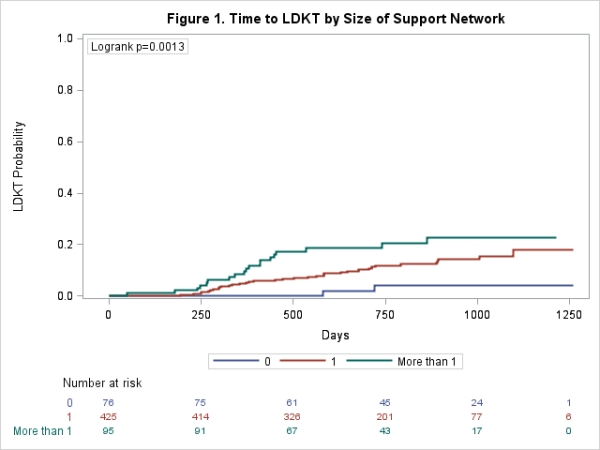Quality of Social Support Network and Access to Transplant: What Matters?
A. Waterman,1,2 J. Beaumont,2 S. Kawakita,2 M. Dunbar-Forest,1 G. Danovitch,1 I. Hong,1 C. Anderson,1 M. Everly,1,2 J. Peipert.1,2
1Division of Nephrology, David Geffen School of Medicine at UCLA, Los Angeles, CA
2Terasaki Research Institute, Los Angeles, CA.
Meeting: 2018 American Transplant Congress
Abstract number: 229
Keywords: Kidney transplantation, Psychosocial
Session Information
Session Name: Concurrent Session: Kidney Psychosocial - 2
Session Type: Concurrent Session
Date: Monday, June 4, 2018
Session Time: 2:30pm-4:00pm
 Presentation Time: 3:18pm-3:30pm
Presentation Time: 3:18pm-3:30pm
Location: Room 210
Recovery after kidney transplant (KT) requires adequate social support. Caregivers are asked to attend transplant evaluation and complete a caregiver contract. Little is known about the association between social support and access to KT. We surveyed 596 kidney patients (38% Female, 26% Black, 38% Hispanic, 35% White) presenting for KT evaluation about their needed vs. received social support. We also reviewed medical records to identify the number and relationship of caregivers attending transplant evaluation. Then, we determined whether patients were waitlisted for transplant or received a LDKT.
A majority (90%) of patients reported receiving as much or more social support than they needed. Only 13% of patients attended transplant evaluation alone. Black patients were more likely to attend evaluation alone (20%) compared to Hispanic or White patients (7% and 13%, respectively, p<0.001). The majority of patients (71%) brought one caregiver to evaluation with 16% bringing two people or more. Of the 636 caregivers, 66% were female; 40% were spouses, 14% parents, 14% children, 11% friends, 12% siblings, and other relatives of the patient (7%).
With a median follow-up time of 14 months, 60% of these patients were wait-listed, and 69 (12%) received a LDKT. Patient-reported adequacy of social support was not associated with either time to waitlist or LDKT but patients with a greater number of caregivers were placed on the waitlist or transplanted faster (Figure 1).
Patients who present with a larger support network during evaluation have greater access to KT. Interventions must focus on how to involve caregivers in the KT process earlier and help caregivers understand and make a firmer commitment to supporting patients undergoing KT.
CITATION INFORMATION: Waterman A., Beaumont J., Kawakita S., Dunbar-Forest M., Danovitch G., Hong I., Anderson C., Everly M., Peipert J. Quality of Social Support Network and Access to Transplant: What Matters? Am J Transplant. 2017;17 (suppl 3).
To cite this abstract in AMA style:
Waterman A, Beaumont J, Kawakita S, Dunbar-Forest M, Danovitch G, Hong I, Anderson C, Everly M, Peipert J. Quality of Social Support Network and Access to Transplant: What Matters? [abstract]. https://atcmeetingabstracts.com/abstract/quality-of-social-support-network-and-access-to-transplant-what-matters/. Accessed February 20, 2026.« Back to 2018 American Transplant Congress

